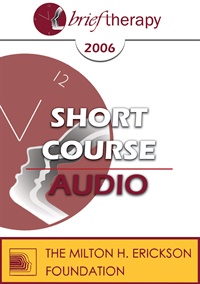BT06 Short Course 04 - Utilization Sobriety: Incorporating the Essence of Body-Mind Communication for Brief Individualized Substance Abuse Treatment - Bart Walsh, MSW
- Average Rating:
- Not yet rated
- Topic Areas:
- Short Courses | Addiction | Brief Therapy | Communication | Mind-Body | Utilization
- Categories:
- Brief Therapy Conference | Brief Therapy Conference 2006
- Faculty:
- Bart Walsh, MSW
- Duration:
- 1:19:30
- Format:
- Audio Only
- Original Program Date:
- Dec 07, 2006
- License:
- Never Expires.
Description
Description:
This presentation poses a brief substance abuse treatment which acknowledges and accommodates the personal needs being addressed by substance use, bypasses perceived resistance and employs the essence of idiosyncratic psychobiological learning to achieve a body-mind gestalt complementary to the client's sobriety. Client self-empowerment and relapse prevention are built into the intervention. This method develops a safe framework for addressing any subsequent mental health themes directly or indirectly related to substance misuse. A particular form of body language known as ideomotor signaling is established in this procedure.
Educational Objectives:
- To describe ideomotor signaling.
- To describe the use of ideomotor signaling in substance abuse treatment.
*Sessions may be edited for content and to preserve confidentiality*
Credits
Faculty

Bart Walsh, MSW Related Seminars and Products
Bart Walsh, MSW is a Licensed Clinical Social Worker and Diplomate in Clinical Social Work. He has practiced in the Portland area since 1987, maintaining the highest professional ethical standards. He directs Affinity Counseling and Hypnosis as well as The Milton H. Erickson Institute of Portland. Bart's orientation to counseling, psychotherapy and hypnotherapy is essentially a strengths perspective with a solution focus. The strengths perspective acknowledges all the strengths, resources and instinctual imperatives within an individual that have helped the individual get to the present moment. The strengths perspective helps scan for the resources needed to resolve or modify the concern that is brought to treatment.


